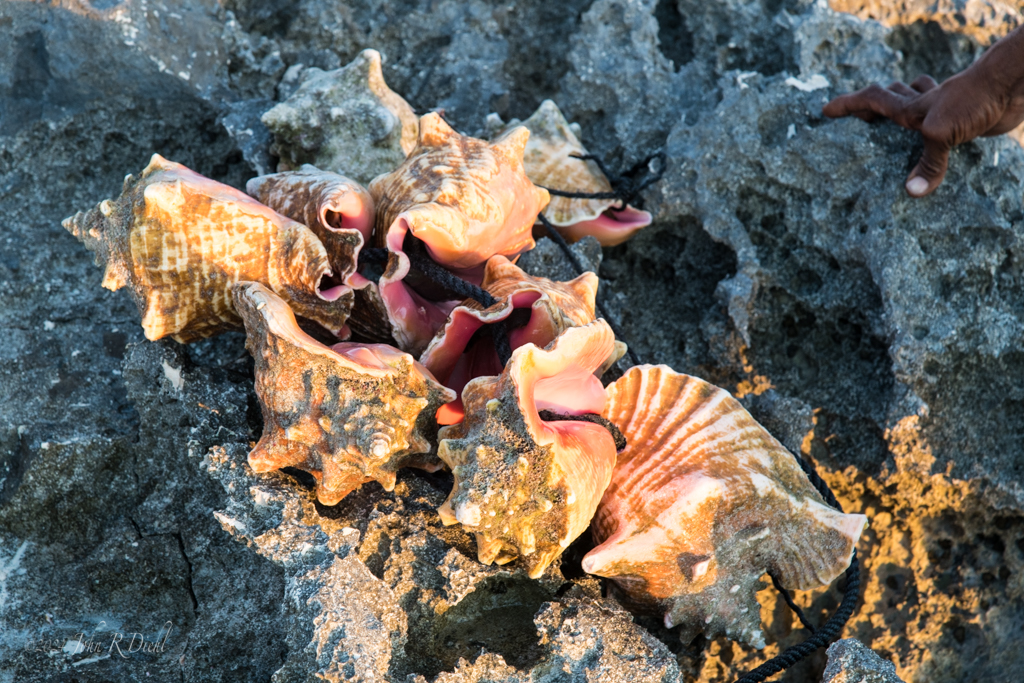
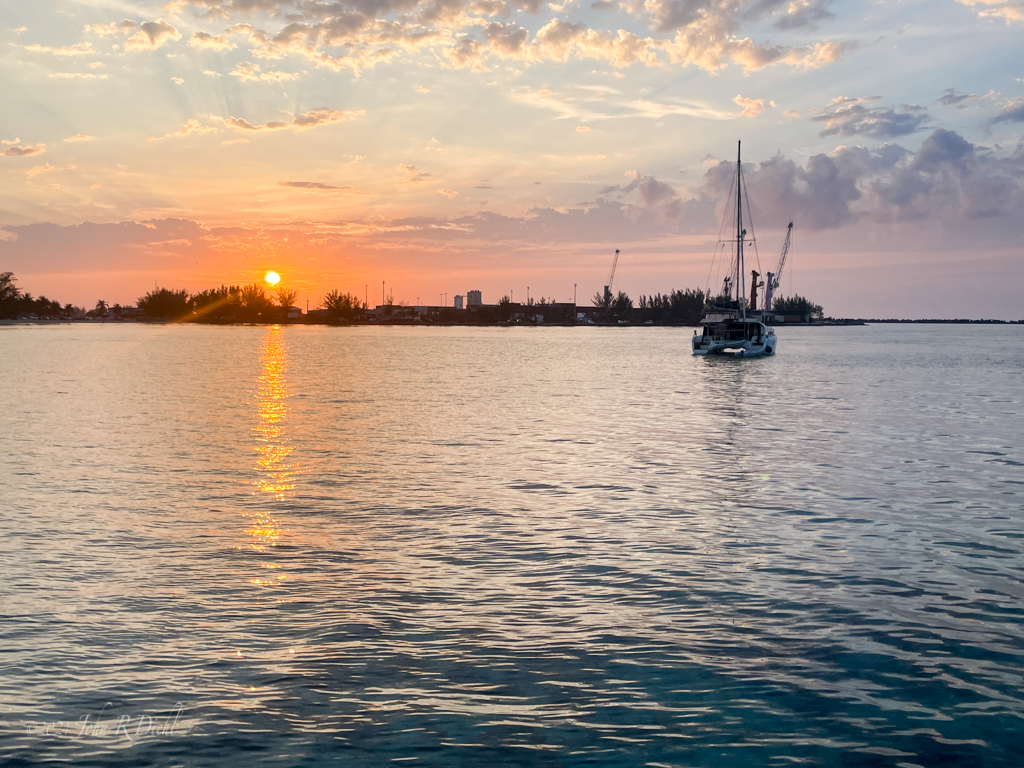
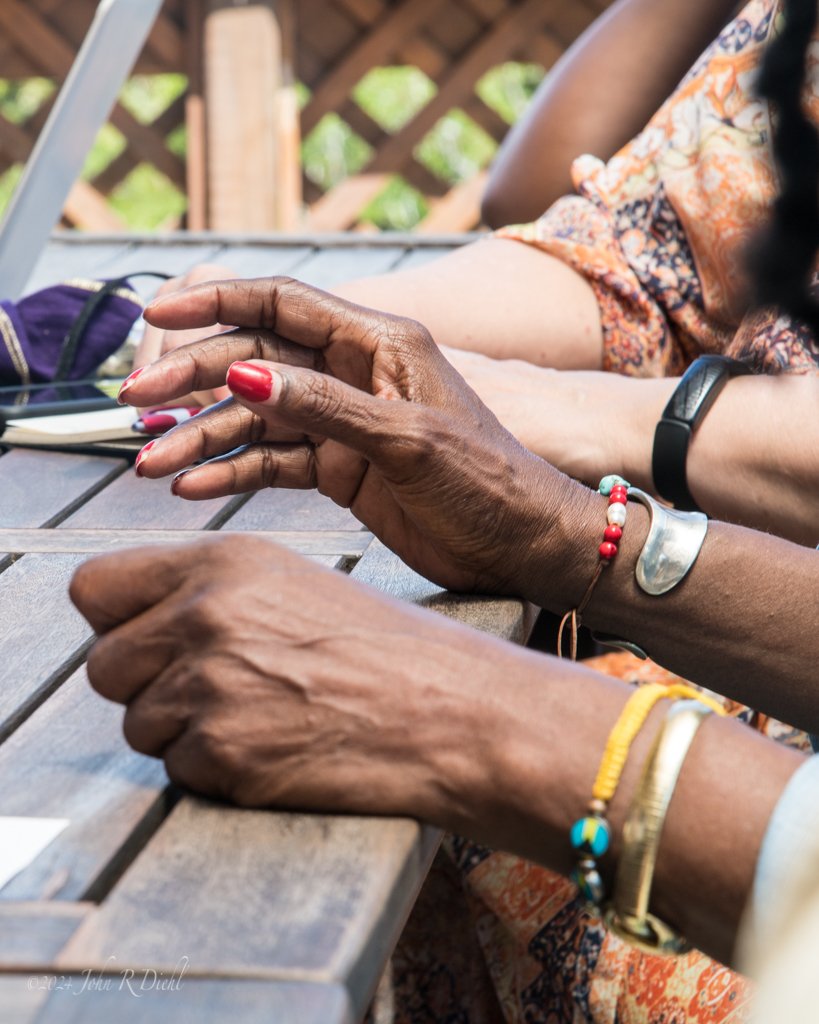
Bahamas
The Bahamas was settled and governed by British colonizers between the 17th and 19th centuries. Their trade routes expanded into profitable and prolific sea highways supporting the movement of goods and enslaved individuals across the Atlantic. Cultural exchange is multinational. Loyalists from the United States resettled in the Bahamas after the Revolutionary War, transforming the out-island settlements from scrappy farmlands to organized and profitable sugar cane plantations.
Today, the Bahamas, and especially the island of Nassau, thrive on tourist economy and international investment, but the “Out Islands” maintain close ties with the historical remnants of enslavement and reflect the resiliency of African diaspora survival patterns. Bahamas research involves ethnographic and folk research on Afro-Caribbean cultures on Cat Island, one of the Out Islands. This 50-mile-long strip of land situated between the Atlantic Ocean and the Caribbean Sea is considered by some to be the first landing site of Christopher Columbus and is the birthplace of the actor Sidney Poitier.
Our intention is to map – through storytelling, foodways, music and archival research – how Caribbean histories intersect with the experiences of Black populations in North America, and especially communities located along coastal waterways. We specifically focus on farming and food practices highlighting ways in which foodways sustain communities and allow them to cope with difficult circumstances imposed by chattel slavery and unpaid labor. Our research demonstrates how Black cultural production and the resiliency of Black populations are expressed through these practices.
Pamela Poitier
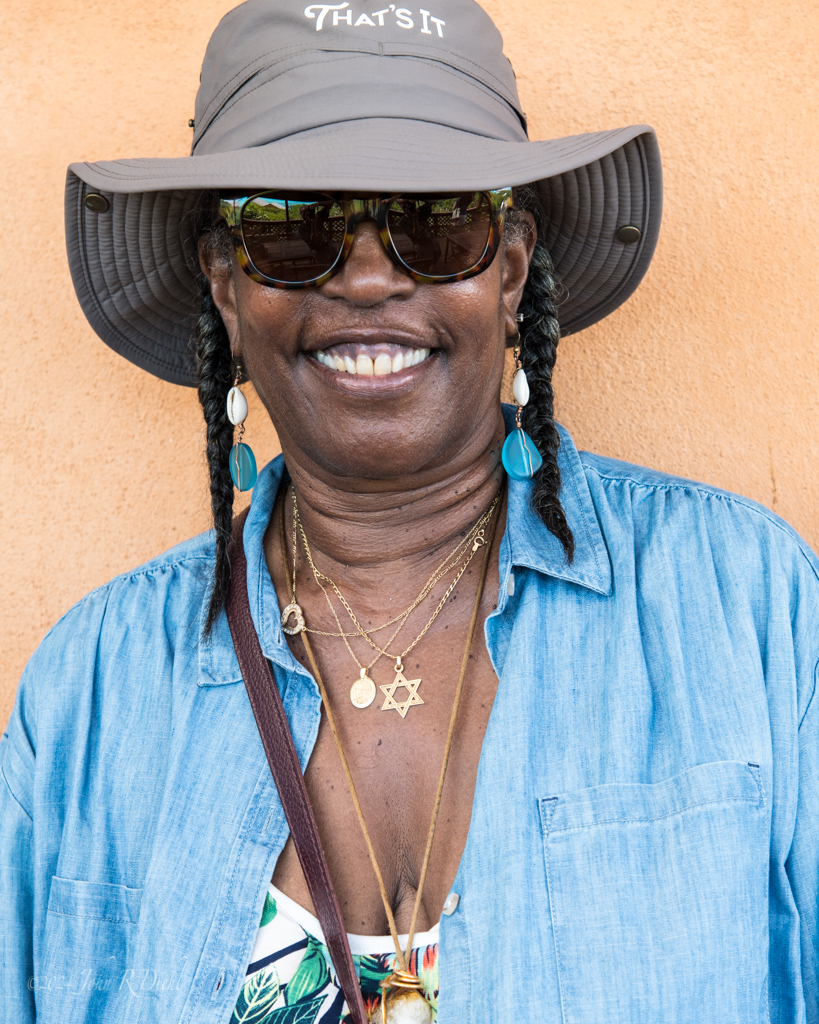
Specialty/Key Words: Cat Islands, Bahamas, Culture, Traditional, Indigenous, Farming, Racism, Building, Sustainability
Interview Summary: Born in the United States, Pamela Poitier now lives off the grid on the north side of Cat Island. Ms. Poitier acts as an educator and playwright who enjoys working with the children of Cat Island and learning traditional values, culture, and history from community elders. Ms. Poitier was interviewed at Shannas Cove Resort on the northern end of Cat Island. Pam began her interview by discussing the history of Cat Island, which was called “Guanahani” by the Indigenous people of the Island. Furthermore, in 1492, it was called San Salvador by Christopher Columbus but later changed to Cat Island because a priest petitioned Parliament to change Watlings Island to San Salvador. Pam’s grandparents were Tomato farmers and exported goods to the United States. Ms. Poitier described her spirituality, experience with racism in the United States, and life on Cat Island. Additional topics included Cat Island history and traditional ways of farming and building houses.
Select Audio Clip:
Ian & Ivan Cleare
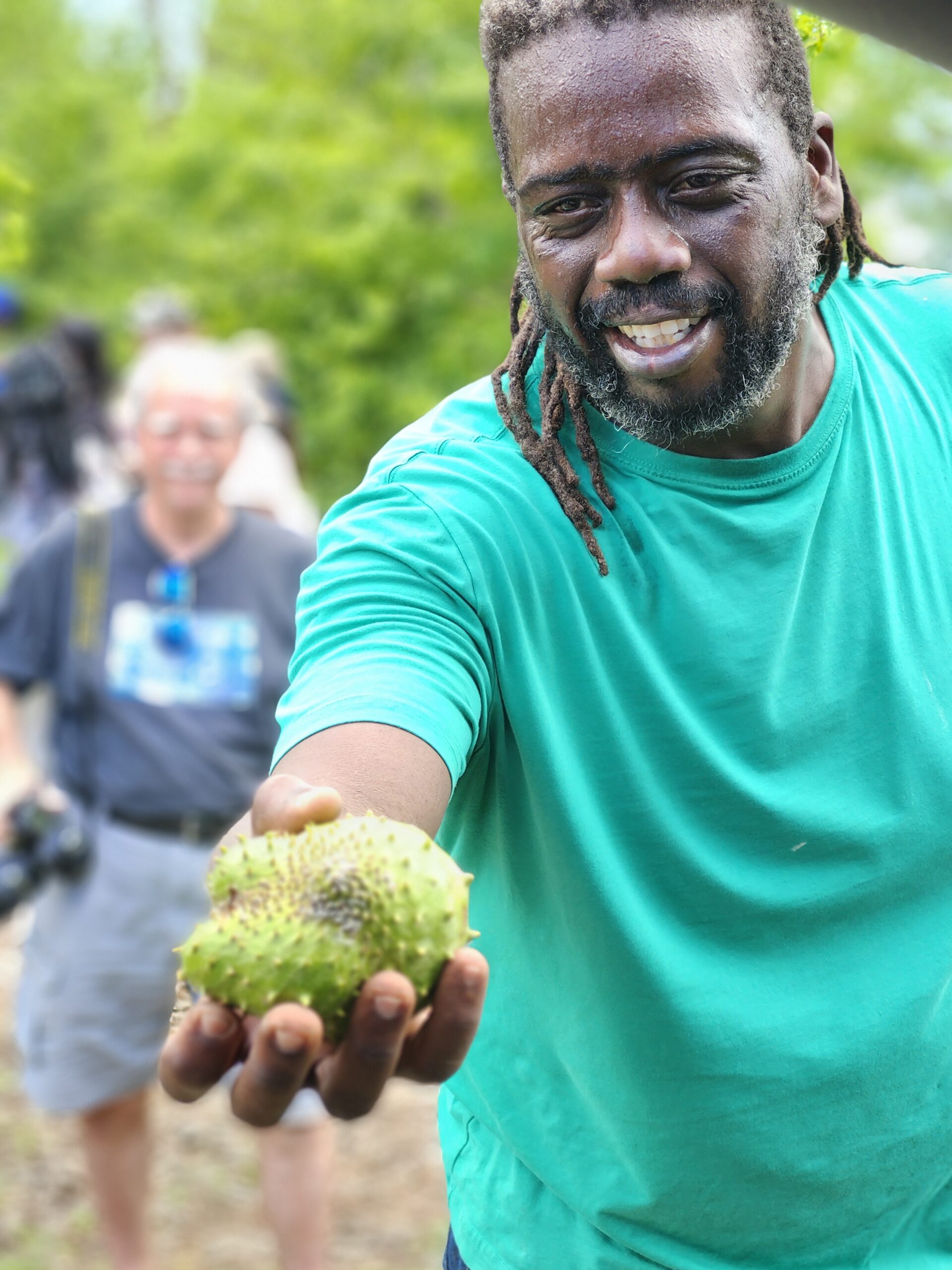
Specialty/Key Words: Cat Islands, Bahamas, Farming, Food, Sustainability, Tradition, Community, Legacy
Interview Summary: Ian and Ivan Cleare are dedicated farmers who combine traditional Lucayan and African farming techniques with local adaptations to thrive in their new environment. They use a mix of traditional tools such as machetes and pickaxes, alongside modern equipment like chainsaws, to manage their farm effectively. Their farming practices are deeply rooted in both inherited knowledge and practical adjustments based on the land’s needs.
They manage their farm with a small, family-run team, emphasizing the importance of self-reliance and creating their own market to avoid exploitation from predetermined pricing systems. By selling directly to customers and working closely with local neighbors, they strive to offer fair prices and maintain a sustainable business model. They also explore value-added products like pepper sauce, reflecting a trend towards innovation in their farming practices.
Ian and Ivan’s approach to farming extends beyond the immediate needs of their business. They are committed to passing down wisdom to younger generations, highlighting the enduring value of agricultural skills and the broader principles of sowing and reaping. They believe that even if one does not pursue farming, understanding how to cultivate something is a valuable skill that can inspire and benefit individuals in various aspects of life.
Their efforts also include a focus on expanding their market reach. They are currently working on obtaining international certification to facilitate the export of their products, ensuring that their farm’s innovations can reach a global audience. Their dedication to this process reflects their commitment to long-term growth and sustainability in their agricultural practices.
Select Audio Clip:
Bloneva Hunter
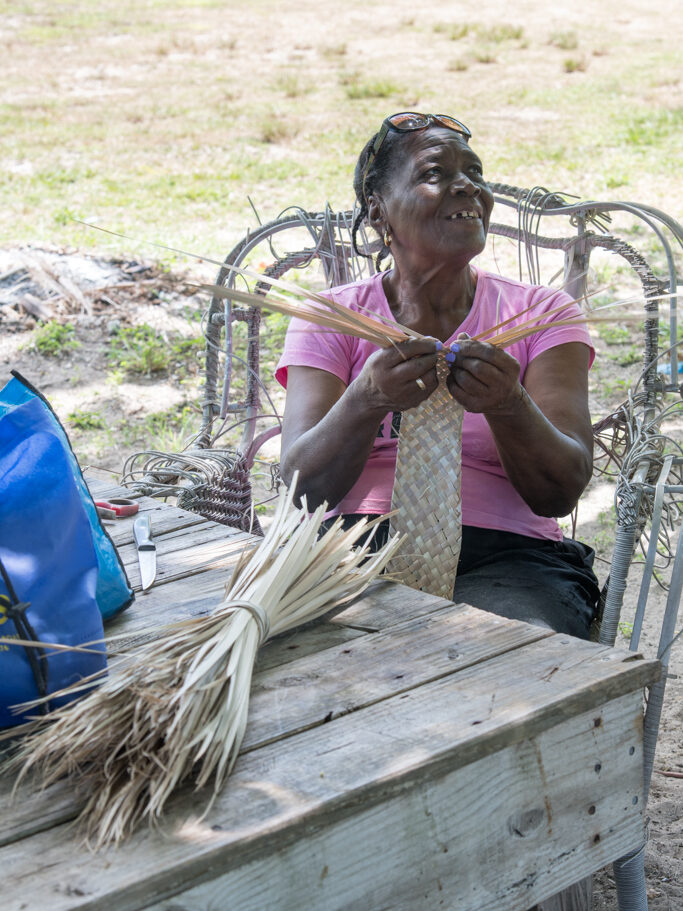
Specialty/Key Words: Cat Islands, Bahamas, Legacy, Craft, Memory, History, Rumors, Stories, Storytelling, Lore, Family, Community
Interview Summary: Bloneva Hunter is the mother of Daisy Mae Hunter. The research team was able to meet and interview the elder Ms. Hunter when they visited the family’s property. The elder Ms. Hunter spoke of her youth, career, family history, and learning ways of cooking and plaiting. She specifically focused on her children and the occupations they took on Cat Island and other Bahamian islands. The elder Ms. Hunter also demonstrated traditional plaiting work and allowed for the research team to try plaiting straw.
Select Audio Clip:
Julian Russell
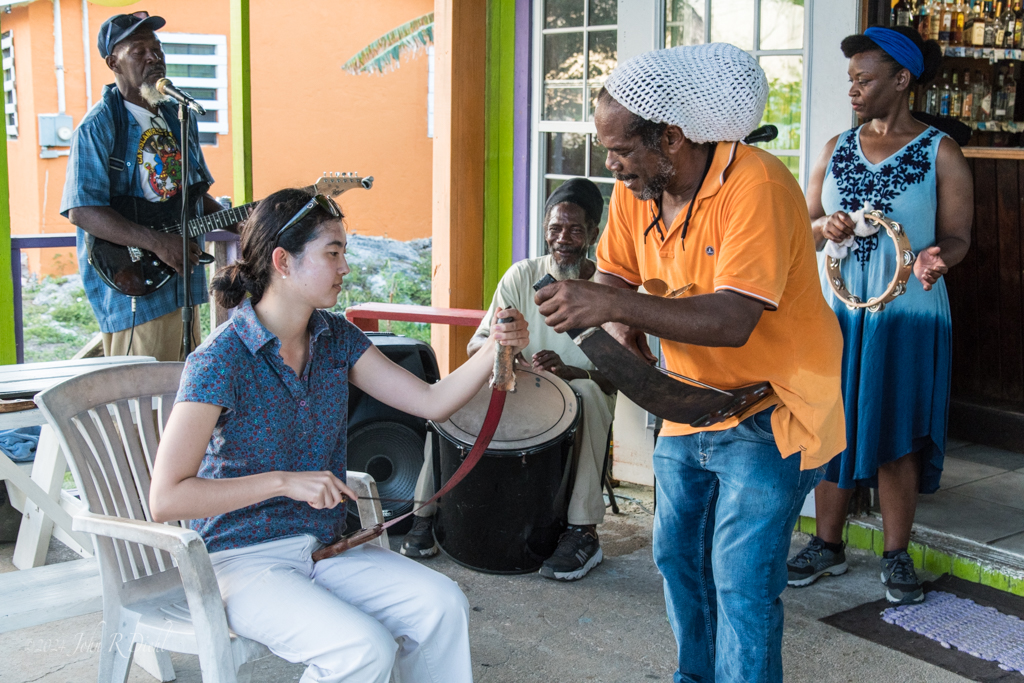
Specialty/Key Words: Cat Islands, Bahamas, Rake and Scrape, Music, Culture, Community, Legacy, Tradition
Interview Summary: Julian Russell is a Rake-and-Scrape musician with his own band and the owner of Da Smoke Pot, which serves traditional Bahamian food. Julian and his band performed for us, using traditional Rake-and-Scrape instruments: saws, screwdrivers, drums, guitar, and other miscellaneous objects. Julian gave us all the chance to play the saw with the screwdriver.
Julian is a second-generation Cat Islander who returned to the island at age 15 after his parents sought better opportunities in Nassau. Adapting to the island’s less developed conditions, he witnessed significant challenges, including delayed electrification until 1992 and the island’s struggles with political and class issues that hindered development and equality. Despite these challenges, Julian is optimistic about the younger generation’s ability to preserve Cat Island’s traditions and culture. He believes in adapting and working collectively to improve the island’s infrastructure while preserving its cultural identity. He encourages a flexible, adaptive approach to life, emphasizing the importance of “going with the flow.”
Select Audio Clip:
Harrison King
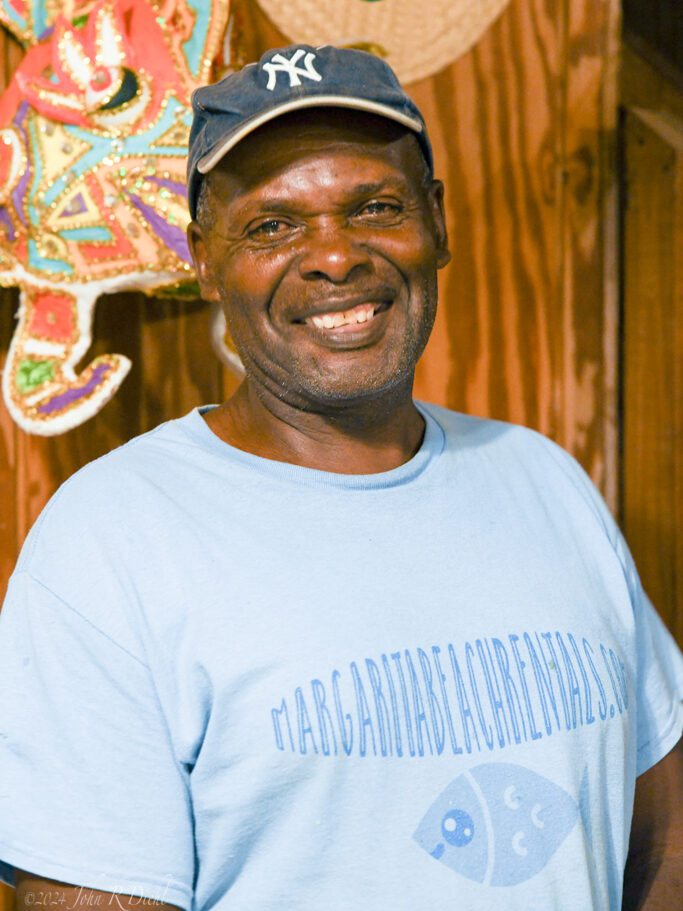
Specialty/Key Words: Cat Islands, Bahamas, Farming, Food, Sustainability, Tradition, Community, Legacy, Religion, Entrepreneur, Culture, Junkanoo, Music
Interview Summary: Harrison King holds a variety of roles on Cat Island including farmer, hotel and restaurant owner, bus driver, housing plan drafter, and pastor. The research team, alongside Yvonne and Margaret Rolle, arrived at Mr. King’s restaurant and were hosted for a meal of traditional Bahamian foods sourced from Mr. King’s farm. Afterwards, the research team conducted the oral interview in the dining room space. Mr. King primarily spoke of his farm, crops, and techniques for farming, fishing, and cooking. Additionally, the interview touched upon Cat Island’s response to severe weather events, the COVID-19 pandemic, and aspects of Bahamian culture. The research team was able to view items relevant to Bahamian life, including Junkanoo masks on the wall and the empty beer bottles used to preserve tomatoes. The research team got a recording of Mr. King and the Rolle sisters as they Cat Island rake and scrape and funeral wake songs.
Select Audio Clip:
Garth King
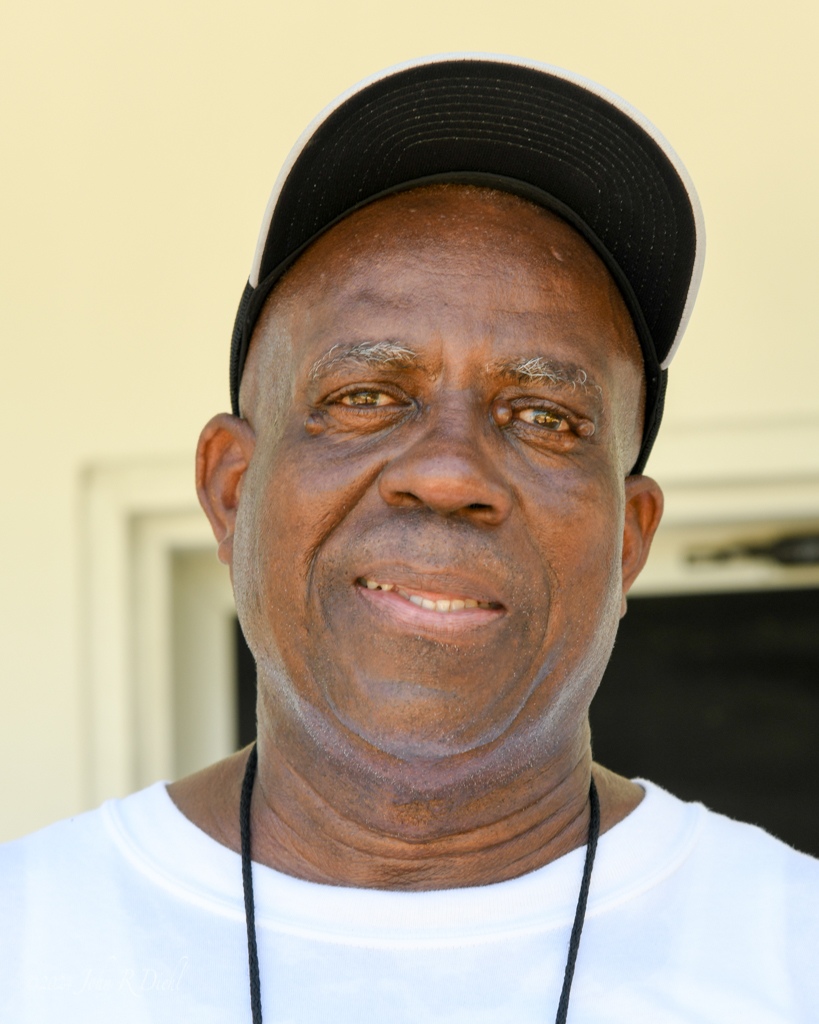
Specialty/Key Words: Cat Islands, Bahamas, Poetry, Education, Culture, Tradition, Tools, Farming, Storytelling, Stories, Food, Land
Interview Summary: Garth King, a former educator on various islands throughout The Bahamas, now farms on the land that used to belong to his grandmother. Mr. King lives with his wife, Rita King, who immigrated from Costa Rica. The research team received a tour of the Kings’ property which includes a pond with turtles, a prospective museum, an outdoor kitchen, his grandmother’s house, and a stone wall. Mr. King brought out several of his crops, laid out his tools for food production, and provided food samples for consumption. The research team watched as Mr. King demonstrated his methods of processing crops into a finished product. Then, the team transitioned into the interview. Mr. King spoke of his experience with racism, teaching on other Bahamian islands, learning food traditions, the community on Cat Island, the next generation of Bahamian youth, and colonialism. In his free time, Mr. King writes poetry. The research team was able to hear several of Mr. King’s poems throughout their stay, including at the stone wall on his property, during the interview, and later at the Rollezz. The poems touch upon themes of colonialism, race, and Bahamian culture.
Select Audio Clip:
Jamaal Moncur
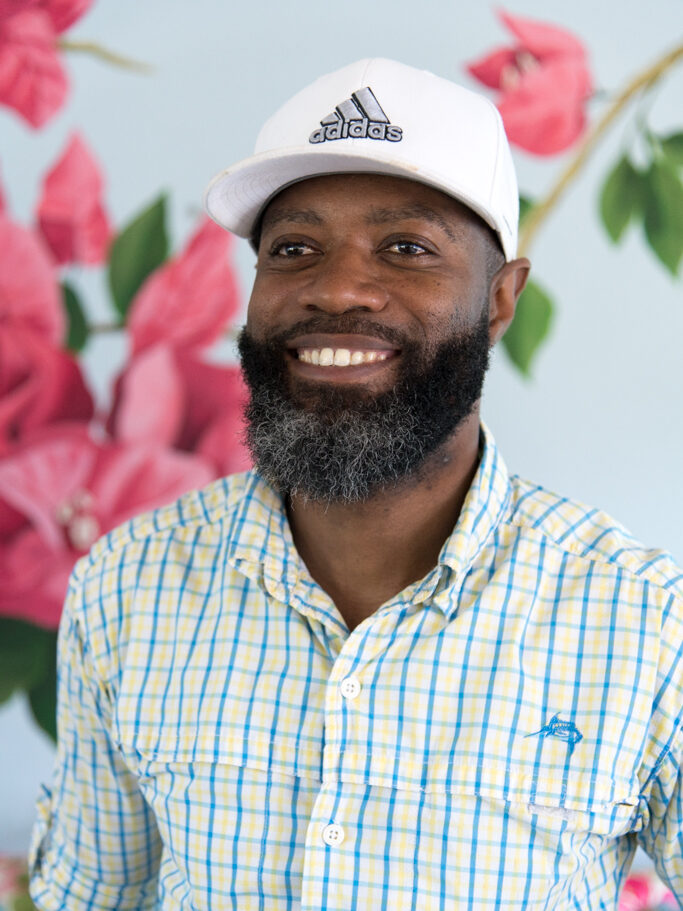
Specialty/Key Words: Cat Islands, Bahamas, Tradition, Recipes, Rumors, Remedies, Healing the Sick, Community, Holistic Medicine, Wellness, Sustainability , Plant-based, Food, Bush Medicine
Interview Summary: Dr. Jamaal Moncur is a renowned herbalist and natural medicine practitioner from Cat Island, Bahamas. Raised in a community rich with traditional knowledge, Dr. Moncur has dedicated his life to preserving and sharing the medicinal wisdom. He was mentored by the world-famous herbalist Dr. Sebi and has studied at various institutions, including the Kingdom College of Natural Medicine and the Herbal Academy of New England. Dr. Moncur is known for his innovative and holistic approach to health, focusing on the healing properties of native plants.
Dr. Jamaal Moncur delves into the rich tradition of using natural foods and plants for health and healing on Cat Island. He shared insights into how locals used plants and fruits such as papaya, wild basil, and fever grass to treat ailments and maintain a long life. Another focus of his is identifying how the “modern” lifestyle eliminates plant health benefits. He discussed the importance of preserving this traditional knowledge in the face of modern health challenges and the benefits of returning to natural, holistic remedies for a healthier lifestyle.
Select Audio Clip:
Rita King
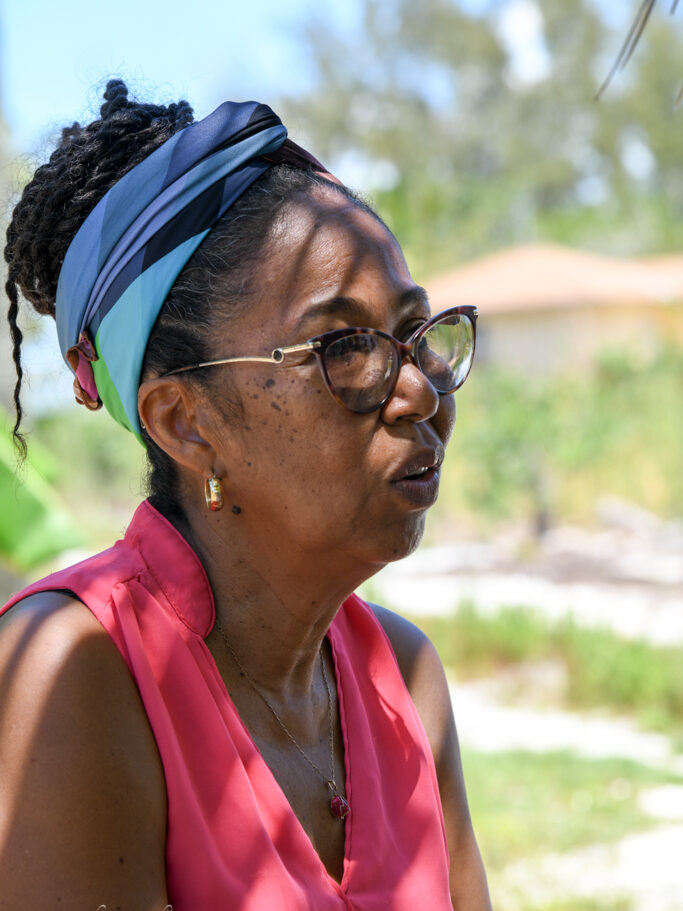
Specialty/Key Words: Cat Islands, Bahamas, Migration, Costa Rica, Farming, Food, Tradition
Interview Summary: Rita King is the wife of Garth King, and the couple lives together on the land of Mr. King’s ancestors. Ms. King was born in Costa Rica, but came to Cat Island on a teaching contract almost two decades ago. When half of the research team viewed Mr. King’s property, the other half stayed behind to interview Ms. King. During the conversation, Ms. King mentioned the similarities between Cat Island and her hometown in the countryside of Costa Rica. She also focused on farming, food, Bahamian traditions, and adjusting to life on Cat Island.
Select Audio Clip:
Daisy Mae Hunter
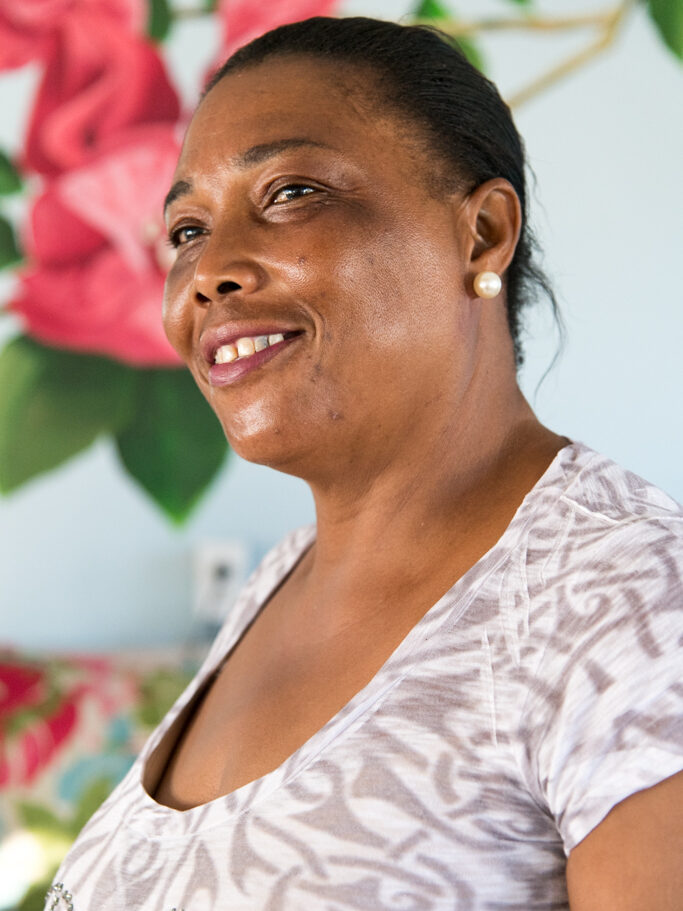
Specialty/Key Words: Cat Islands, Bahamas, Healing the Sick, Community, Holistic Medicine, Wellness, Recipes, Remedies, Rumors, Bush Medicine, Farming, Fishing, Tradition, Food, Lore, Culture, Craft
Interview Summary: Daisy Mae Hunter is a farmer, crafter, and specialist for knowledge on bush medicine. The research team first conducted their interview with Ms. Hunter at the Rollezz. Ms. Hunter described the bush medicine available on Cat Island and her role in sharing information throughout the community. Ms. Hunter also spoke about food traditions in her childhood, methods of farming and fishing, and the COVID-19 pandemic. Several days later, Ms. Hunter hosted the research team at her property. The team received a tour of the Hunter family plantation and ruins, Ms. Hunter’s shop The Sweet Tambrin, and the outdoor kitchen on her property. Afterwards, the team ate lunch prepared by Ms. Hunter.
Select Audio Clip:
Christopher Stubbs
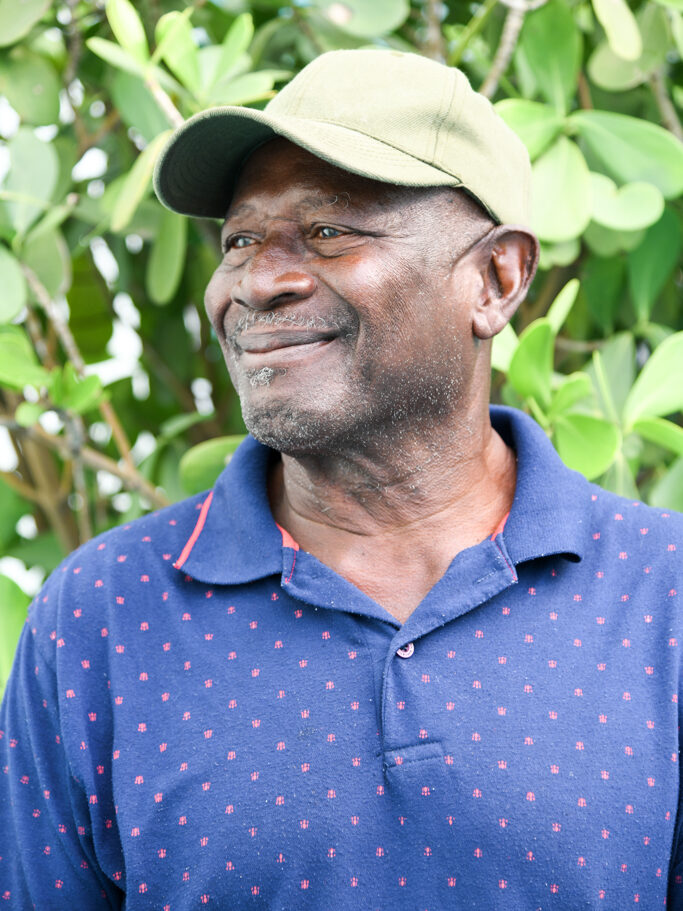
Specialty/Key Words: Cat Islands, Bahamas, Farming, Food, Sustainability, Tradition, Community, Legacy, Land, Culture, Bush Medicine
Interview Summary: Mr. Christopher Stubbs is a versatile and esteemed individual from Cat Island, Bahamas, with a diverse background and extensive contributions to his community. His life’s journey includes roles as a farmer, landowner, teacher, commissioner, and police officer. Born and raised in a time when modern medical facilities were scarce, Mr. Stubbs grew up witnessing the ingenuity and resourcefulness of his elders who relied on traditional bush medicine for healthcare. This knowledge, passed down from generation to generation, became an integral part of his upbringing and later, his life. As a dedicated farmer and landowner, Mr. Stubbs has been instrumental in maintaining the agricultural heritage of Cat Island, cultivating crops and ensuring the sustainability of traditional farming practices. His connection to the land is profound, reflecting a deep respect for nature and the wisdom of his ancestors. In addition to his agricultural endeavors, Mr. Stubbs served his community in various capacities. His commitment to public service extended to roles as a commissioner and police officer.